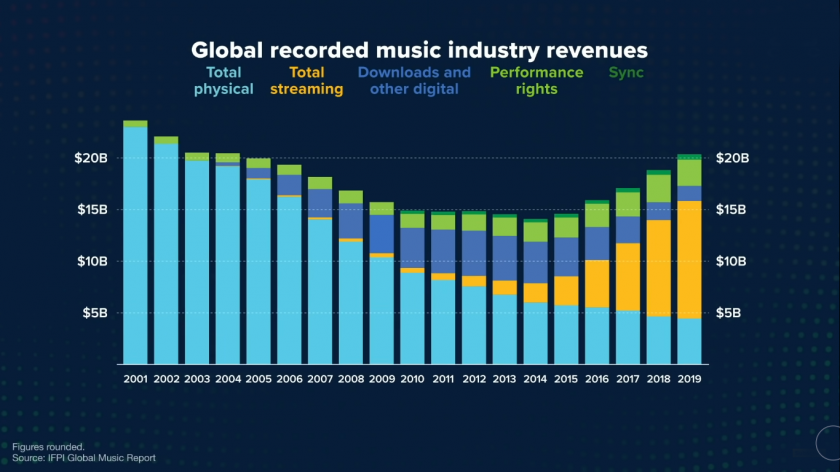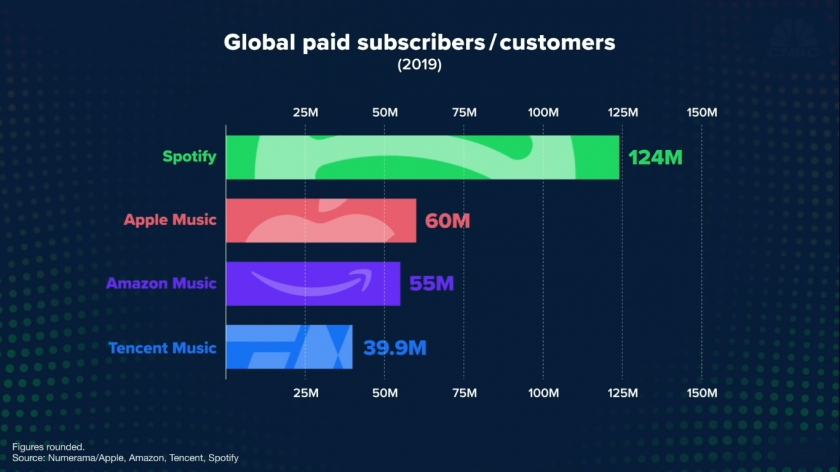Listening to music has become a part of any civilization of this age. Not only that, music has an importance in the thousands of years of history of human civilization. In the wake of the advent of the Internet, the world has undergone a major change in the last twenty years. The music streaming service has brought a big change in the way we can enjoy music. The beginning of this streaming service was the history of piracy. What started with piracy has turned into a ১১ 11 billion market today, occupying 56 percent of the entire industry in 2019. The company that has won this competition so far in terms of number of customers is Spotify.
Spotify has dominated the entire music streaming world, losing out to giant companies like Apple, Amazon and Google. Spotify has 130 million premium subscribers worldwide. However, according to the data of 2019, Spotify in the United States is still satisfied with the number two place behind Apple. In recent times, Spotify has made many decisions to capture their market share. For example, they bought the rights to comedian Joe Rogan's hugely popular podcast. Again, Kim has signed deals with Kardashian and DC Comics. Their motive is to break free from the shackles of the music world and become the giants of the entire audio industry. Spotify's Chief Content Officer Don Astroff said:
The companies that we bought and the talent that we have brought onto the platform will help us become the number one audio platform in the world.
The global epidemic caused by Covid-19 has also contributed to Spotify's customer growth. Many people have turned to the Internet as a result of this epidemic. Spotify was no exception. However, Spotify has also been accused of failing to pay a fair share of profits to artists.
 In 2019, streaming services accounted for 56 percent of the entire music industry; Image Source: CNBC
In 2019, streaming services accounted for 56 percent of the entire music industry; Image Source: CNBC
Entertainment has changed a lot since the advent of the Internet, but it has never had a conflicting relationship with anyone like the music industry. CDs were the main medium for selling and listening to music in the nineties. At the time, computers were reaching people's homes, and most of them had built-in CD drives. As a result, it was easy to buy a CD of your favorite song and listen to it on your computer. Platforms like Napster and Limeware came up with ways to share music. However, this opened a big door for piracy.
Following the success of iTunes and the iPod, Apple decided in 2003 to sell digital music. As a result, they had the opportunity to build a strong position in the industry by eliminating piracy. And they succeeded. They started selling songs online, replacing platforms like Napster. At first, however, many doubted whether people would spend 99 cents on each song. But Apple's success was so great that they somehow managed to sell all other ways to sell music. Even music stores were closing. Such a change was a big shock for the entire music industry.
Usually a CD would sell for twenty dollars, whereas it would cost only one dollar to make. At that time the profit was huge. From there it sold for 9.99 per album on iTunes. Thus the profits began to decline. Music lovers, who wanted to listen to free music, still liked radio. The online radio company Pandora occupied a large part of that market. The company was founded in 2000. Ten years later, they had 46 million subscribers.
 In the United States, Spotify still has to settle for number two behind Apple; Image Source: CNBC
In the United States, Spotify still has to settle for number two behind Apple; Image Source: CNBC
The problem is, piracy was still going on. A 2006 study found that the United States was losing ১২ 12.5 billion a year to music piracy. Although radio was a good way to go, customers could not choose the music they wanted. That place became the gateway to a small Swedish company we know as Spotify. Spotify co-founder and CEO Daniel Yek said,
We want music to be like water, everywhere.
Spotify was founded in 2006 and entered the United States in 2011. At first they only started as an 'invite only' beta program. Very soon they were getting good reviews. They started taking copyrights from different music companies. At the time, they were encouraging customers to use the platform. That's when Spotify was having their hardest time.
One of the reasons for the delay in entering the US market was copyright. For 2016, Spotify had to spend ৮ 9.6 billion for this. Of course they knew they had to spend. In order to retain investors and customers, to get the right to streaming content, money has to be spent. However, once he gets the right, if the amount of customer can be increased then there is no need to look back.
In this era, every major technology company has its own music streaming platform. Apple came out of iTunes and founded Apple Music. Amazon has created Amazon Music. Google has Google Play Music and YouTube Music. Even the famous rapper Jay-G bought shares of one of his platforms called Tidal. However, its purpose is professional sound quality. In all this, Spotify has retained its top spot. A big reason for this is their 'freemium' model. Customers can listen to free music if they wish, but they also have to listen to advertisements. Those who do not want to hear the ads, they spend money to buy premium services.
At the end of 2019, Apple Music had 60 million subscribers, compared to 55 million for Amazon Music. Chinese company Tencent had 39.9 million subscribers. Spotify had 124 million premium subscribers. The free model has played a very good role behind so many premium customers of Spotify. After listening to free music for a long time, many people became interested in using the premium service. Apple, on the other hand, forces customers to pay only after the Music Free trial has passed. Even when Apple Music started its journey, they tried to block the free version of Spotify.
 At the end of 2019, Spotify had 124 million premium subscribers; Image Source: CNBC
At the end of 2019, Spotify had 124 million premium subscribers; Image Source: CNBC
The free thing is definitely good for the customers. This is why Spotify is so popular today. But the same thing is not good for musicians at all. What Spotify earns from advertising is much less than premium service. On the other hand, customers have to pay on platforms like Apple Music or Tidal. So it is difficult for an artist to make a decision. Will he pay attention to Apple Music because there is more money to be made? Again, Spotify has the most customers. So if you want to reach more listeners, there is no alternative to Spotify.
When Spotify began to rise in popularity, many artists wondered why they weren't making as much profit as in the download era. In 2014, Taylor Swift famously boycotted Spotify. He took all his songs away from there. His complaint was that he and many other artists were not making enough profit for each stream. In 2015, Adele followed in his footsteps. He did not release his '25' album Spotify or Apple Music.
Then there was the practice of releasing albums on a single platform or not releasing an album on any streaming service for a certain period of time. The songs of many artists were not available on Spotify for a long time then. Apple Music made quite a profit in this place. Later, however, Taylor Swift and Adele returned to Spotify. But streaming services faced a question: how much profit do they make to an artist per stream? Neither Spotify nor Apple has answered this question anywhere. However, experts estimate that Spotify pays up to 80 percent of the profits per stream.
Spotify announced in 2019 that they wanted to move away from music-based platforms to an audio platform. The reach of Spotify all over the world will increase further. At present, 90 percent of Spotify's profits come from premium services. The remaining ten percent is from advertising. The idea of Spotify executives is that advertising has a great potential to grow their market. Podcasts can be such a medium.
Since the onset of the global epidemic, Spotify is one of the few companies that has not suffered an economic loss. On the contrary, from January to June of 2020, their stock has increased by 70 percent. People have turned their attention to streaming services to spend time under house arrest.
While Spotify's top position seems secure, competition can emerge from a variety of angles. For example, Tencent has added a karaoke feature to their platform. Spotify has to pay attention to such things. There is an opportunity to focus on the other side only from the streaming platform.
It currently has agreements with three of the largest record label companies, namely Sony, Universal and Warner Music Group, for all major streaming platforms. These three companies occupy 80 percent of the music world. If for some reason the music streaming platform takes the shape of the video streaming platform market, then many such platforms will suffer. Content from Netflix or Amazon is different. That is, content from one platform to another cannot be found. Because they have to deal with different production houses separately and the contracts are exclusive. That is, the same content cannot be found on other platforms. It can happen in the music streaming market for any reason.
Whatever the competition, Spotify is a huge success story. They have to give credit for dominating the market by competing with the world's largest technology companies. Spotify has recently launched its services in 65 new countries, including Bangladesh. Analysts are waiting to see how successful they will be in these countries.











Comments (1)